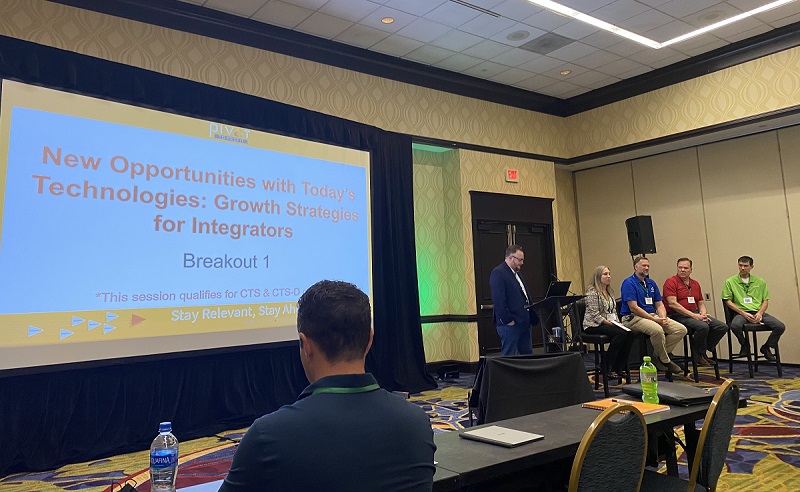In-person events are back, and I went to the one of the first in-person pro AV conferences to be held last month: NSCA’s Pivot to Profit.
It’s been almost two years since I’ve met any of you in person, so I was vaccinated, masked and ready to talk shop with professionals in the industry I’m tasked with covering.
I came away from every session with a ton of ideas for content and material, much of which you’ll see in the November print edition of Commercial Integrator and future articles on this website.
However, I found one session to be particularly important: New Opportunities with Today’s Technologies: Growth Strategies for Integrators. As we all should know, the pandemic has accelerated many trends in technologies since organizations around the world looked to software and hardware to help them maintain business continuity and connect with employees and customers in new ways.
Buildings and AV systems will become more intelligent
Maureen Pajerski, chief operating officer of AI computer vision company Intellisee, said integrators “can no longer think in terms of buildings.” In short, the workplace experience should be very similar to the technology experience at home.
One-touch conference room solutions will replace systems that require using a touch panel or hooking up other devices.
“You’re going to see a lot of buildings operate … as they do at home,” she said.
According to Pajerski, deploying intelligent AV systems – especially those equipped with machine learning technologies that help improve the intelligent capabilities over time – can help integrators maximize their recurring revenue.
Getting customers to continue paying for systems requires there to be a value add to systems you install, and AI that continues to learn does just that, Pajerski says.
“With artificial intelligence, the value added is built into the product,” she says. “It automatically gets better.”
Customers want the simplicity of work-at-home tech
The idea of mixing home and work lives has been a constant theme throughout the pandemic, with children, pets and objects in the background of a Zoom call offering a glimpse into our personal lives.
However, working from home is giving your customers a new way of looking at the technology they use to do their jobs, according to Harry Aller, CTO at Innovative Lighting, who says those remote workers are becoming tech experts.

From left to right: Moderator Tim Hennen, NSCA Emerging Technologies Committee Chair and panelists Harry Aller, CTO at Innovative Lighting, J.B. Fowler, Chief Product Officer at Domotz, Maureen Pajerski, CCO at Intellisee, Jerry Siefkes, Head of Channel Sales at Ascom
“They’re competing with you,” Aller says. “They have family members at home that worked in their school auditoriums that are now handling their personal tech and solving their problems.”
If and when offices do fully reopen, many of those remote workers will demand that technology resemble what they used at home. That threatens to change the typical integrator’s business model, Aller says.
“We used to be the experts, we created the instructions, we pasted them on the wall, we develop the user interface, and they had to abide by those rules,” Aller says. “They just got a glimpse at what it means to not abide by those rules, so they’re going to come back to the office and they’re gonna try to tell us how to do our job.”
You need to think about cybersecurity now
If your customers aren’t already asking about your security posture and the security of the AV systems you’re installing for them, get ready, says J.B. Fowler, chief product officer at Domotz, a network monitoring company.
Fowler cites the increasingly strict cybersecurity regulations coming down from the U.S. and state governments which are undoubtedly set to be adopted by organizations of all sizes as they deal with an increasing rate of cyberattacks.
“The IT departments are having to deal with this now, and there’s no doubt in my mind that you guys as integrators who are selling products, selling rooms, selling digital signage or whatever it may be … are going to have to deal with that,” Fowler says.
This presents a challenge to most integration firms, but it also presents an opportunity, Fowler says.
“I don’t know a lot of integrators that have chief security officers or chief information security officers,” Fowler says. “You may want to start thinking about that and start understanding the regulations that are going on.”
Healthcare changes present a great opportunity
The COVID-19 pandemic has accelerated many trends in technology, but perhaps the most impacted industry is healthcare – for obvious reasons.
The virus is highly contagious, which necessitates the need for remote communication technologies within a healthcare environment, including telehealth and others. Technology changes in healthcare typically move slowly, but the industry moved quickly to innovate during the pandemic, says Jerry Siefkes, head of channel sales at Ascom, which sells communication systems for healthcare customers.
“COVID has accelerated that by several orders of magnitude,” Siefkes says. “Things that would have taken 20 or 30 years before it got there just happened overnight.”
Specifically, technology like remote controlling that allows a healthcare workers to set up and adjust a monitor “without having to gown up and walk into a room” have been critical over the course of the pandemic.
“You guys are in a great position to help implement those with healthcare,” Siefkes says










